Murdoch University BBS301: Consultancy Research on Ethical Consumers
VerifiedAdded on 2023/04/10
|13
|2352
|215
Report
AI Summary
This consultancy research project investigates the concept of ethical consumers and their purchasing intentions, particularly in the context of "Shop here," a company targeting this market segment. The report includes a literature review analyzing ethical consumerism, its existence in the market, and its influence on purchasing decisions. The research employs a mixed-methods approach, utilizing both qualitative and quantitative data from previous research studies, articles, and journals. The review identifies key themes such as the rise of ethical consumers, the definition of ethical consumerism, and the characteristics of the ethical consumer market. It also addresses the business imperative of understanding this market segment and its potential impact on corporate reputation. The report aims to provide insights and recommendations for companies targeting ethical consumers, considering both opportunities and threats associated with this market.
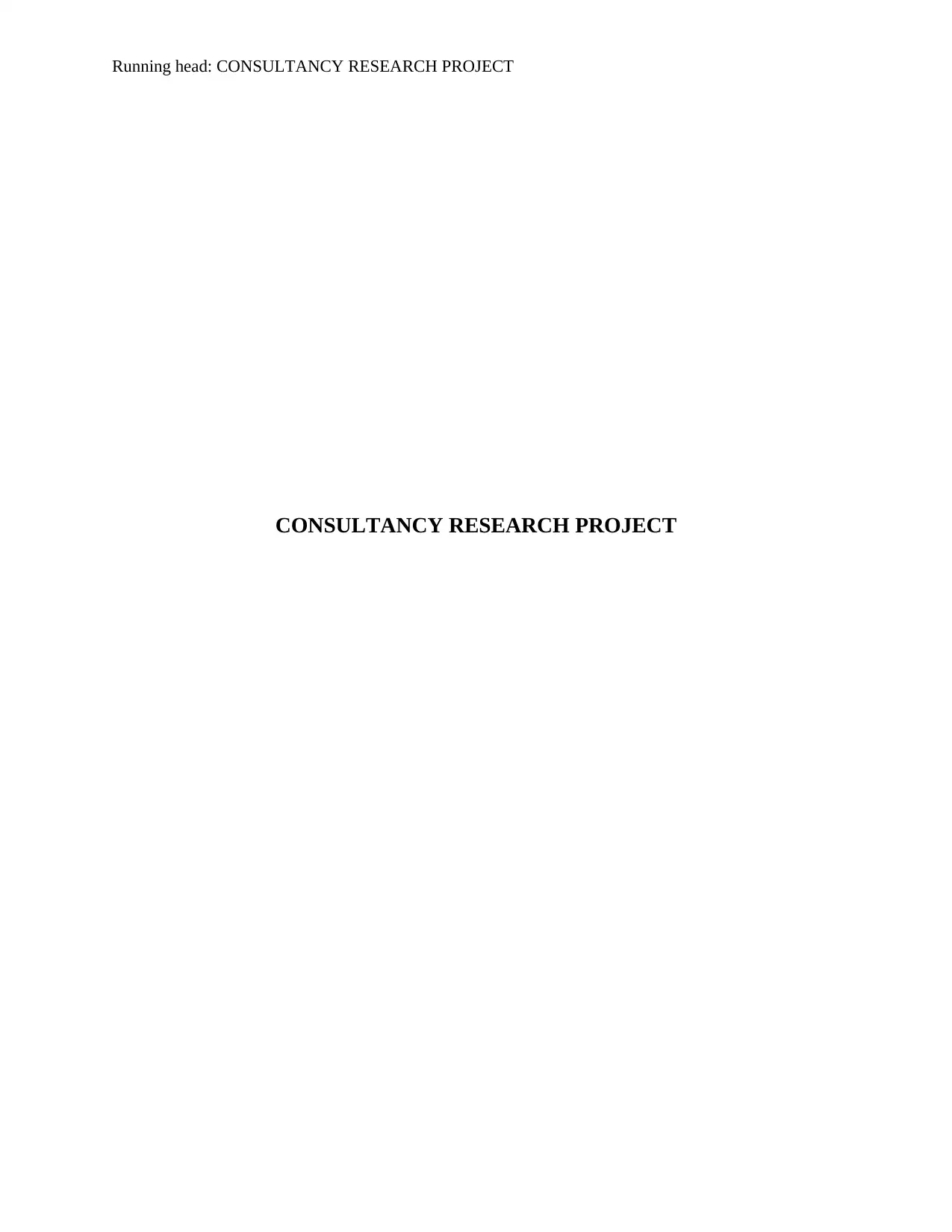
Running head: CONSULTANCY RESEARCH PROJECT
CONSULTANCY RESEARCH PROJECT
CONSULTANCY RESEARCH PROJECT
Paraphrase This Document
Need a fresh take? Get an instant paraphrase of this document with our AI Paraphraser
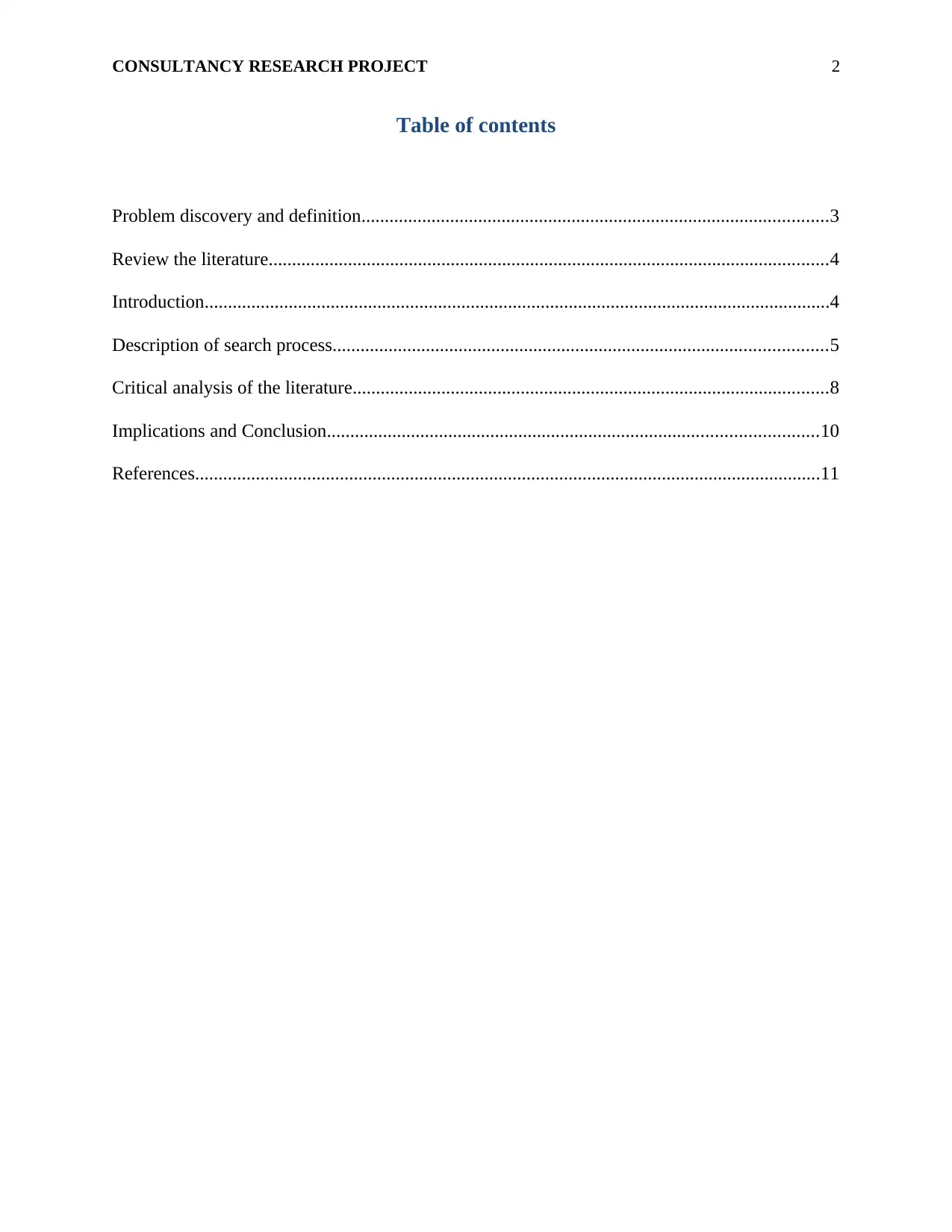
CONSULTANCY RESEARCH PROJECT 2
Table of contents
Problem discovery and definition....................................................................................................3
Review the literature........................................................................................................................4
Introduction......................................................................................................................................4
Description of search process..........................................................................................................5
Critical analysis of the literature......................................................................................................8
Implications and Conclusion.........................................................................................................10
References......................................................................................................................................11
Table of contents
Problem discovery and definition....................................................................................................3
Review the literature........................................................................................................................4
Introduction......................................................................................................................................4
Description of search process..........................................................................................................5
Critical analysis of the literature......................................................................................................8
Implications and Conclusion.........................................................................................................10
References......................................................................................................................................11
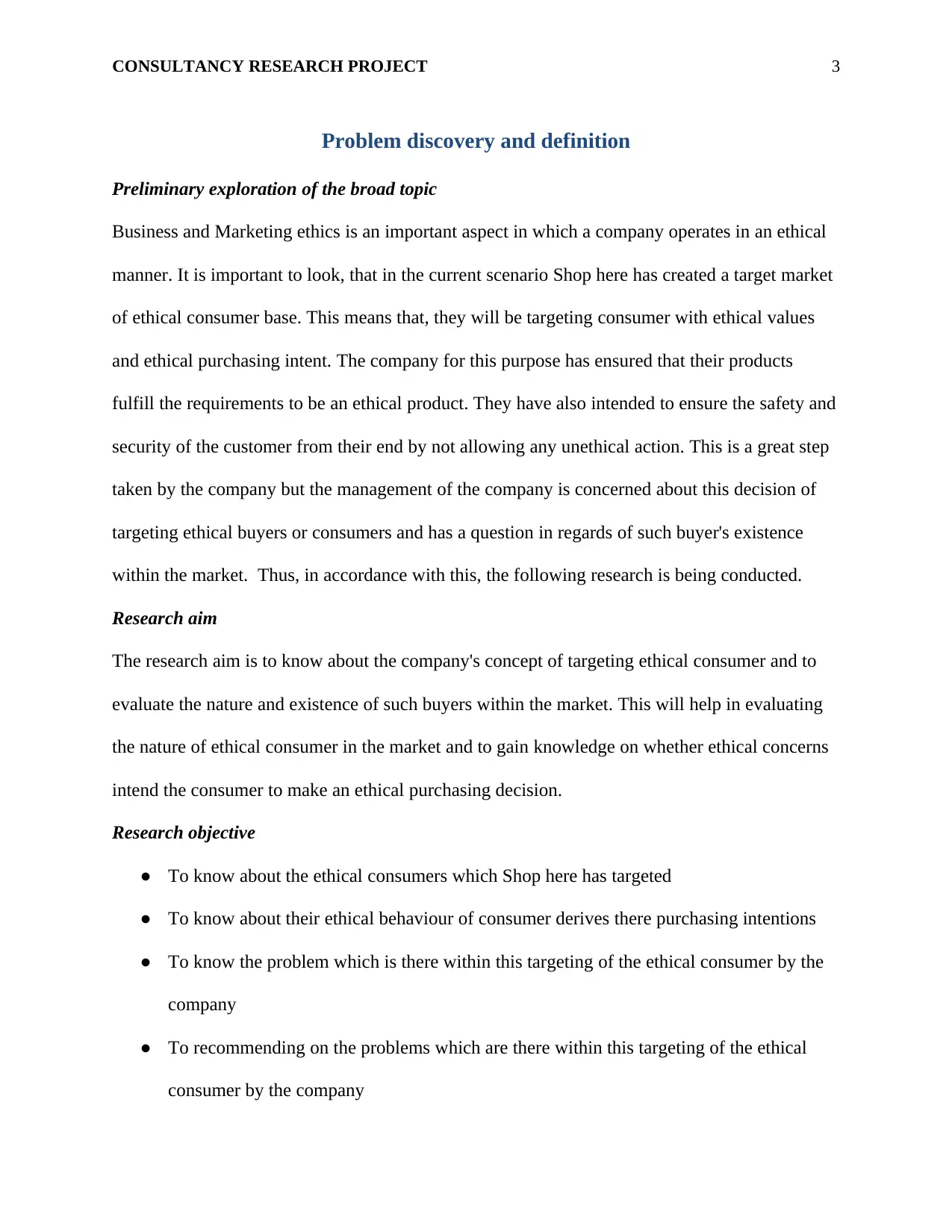
CONSULTANCY RESEARCH PROJECT 3
Problem discovery and definition
Preliminary exploration of the broad topic
Business and Marketing ethics is an important aspect in which a company operates in an ethical
manner. It is important to look, that in the current scenario Shop here has created a target market
of ethical consumer base. This means that, they will be targeting consumer with ethical values
and ethical purchasing intent. The company for this purpose has ensured that their products
fulfill the requirements to be an ethical product. They have also intended to ensure the safety and
security of the customer from their end by not allowing any unethical action. This is a great step
taken by the company but the management of the company is concerned about this decision of
targeting ethical buyers or consumers and has a question in regards of such buyer's existence
within the market. Thus, in accordance with this, the following research is being conducted.
Research aim
The research aim is to know about the company's concept of targeting ethical consumer and to
evaluate the nature and existence of such buyers within the market. This will help in evaluating
the nature of ethical consumer in the market and to gain knowledge on whether ethical concerns
intend the consumer to make an ethical purchasing decision.
Research objective
● To know about the ethical consumers which Shop here has targeted
● To know about their ethical behaviour of consumer derives there purchasing intentions
● To know the problem which is there within this targeting of the ethical consumer by the
company
● To recommending on the problems which are there within this targeting of the ethical
consumer by the company
Problem discovery and definition
Preliminary exploration of the broad topic
Business and Marketing ethics is an important aspect in which a company operates in an ethical
manner. It is important to look, that in the current scenario Shop here has created a target market
of ethical consumer base. This means that, they will be targeting consumer with ethical values
and ethical purchasing intent. The company for this purpose has ensured that their products
fulfill the requirements to be an ethical product. They have also intended to ensure the safety and
security of the customer from their end by not allowing any unethical action. This is a great step
taken by the company but the management of the company is concerned about this decision of
targeting ethical buyers or consumers and has a question in regards of such buyer's existence
within the market. Thus, in accordance with this, the following research is being conducted.
Research aim
The research aim is to know about the company's concept of targeting ethical consumer and to
evaluate the nature and existence of such buyers within the market. This will help in evaluating
the nature of ethical consumer in the market and to gain knowledge on whether ethical concerns
intend the consumer to make an ethical purchasing decision.
Research objective
● To know about the ethical consumers which Shop here has targeted
● To know about their ethical behaviour of consumer derives there purchasing intentions
● To know the problem which is there within this targeting of the ethical consumer by the
company
● To recommending on the problems which are there within this targeting of the ethical
consumer by the company
⊘ This is a preview!⊘
Do you want full access?
Subscribe today to unlock all pages.

Trusted by 1+ million students worldwide
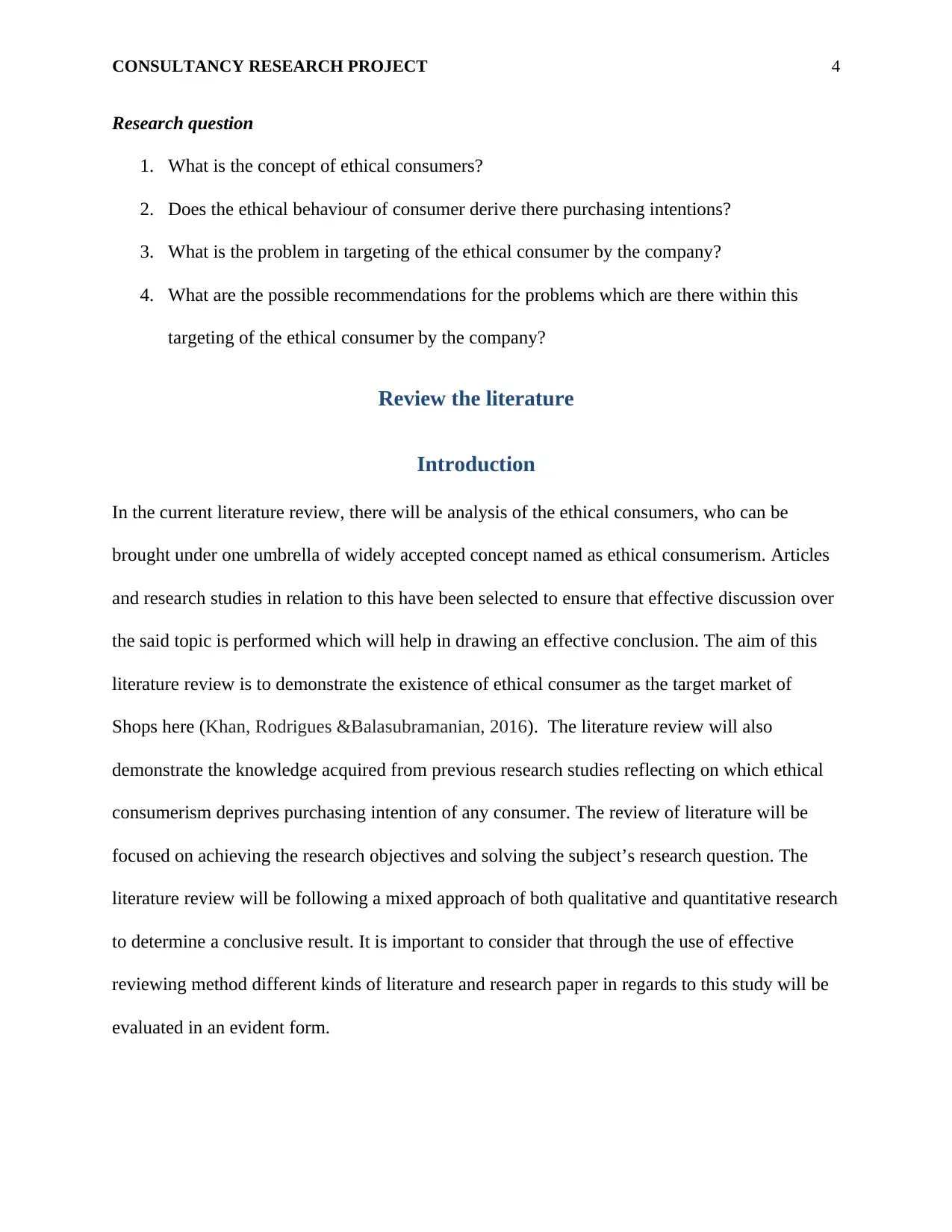
CONSULTANCY RESEARCH PROJECT 4
Research question
1. What is the concept of ethical consumers?
2. Does the ethical behaviour of consumer derive there purchasing intentions?
3. What is the problem in targeting of the ethical consumer by the company?
4. What are the possible recommendations for the problems which are there within this
targeting of the ethical consumer by the company?
Review the literature
Introduction
In the current literature review, there will be analysis of the ethical consumers, who can be
brought under one umbrella of widely accepted concept named as ethical consumerism. Articles
and research studies in relation to this have been selected to ensure that effective discussion over
the said topic is performed which will help in drawing an effective conclusion. The aim of this
literature review is to demonstrate the existence of ethical consumer as the target market of
Shops here (Khan, Rodrigues &Balasubramanian, 2016). The literature review will also
demonstrate the knowledge acquired from previous research studies reflecting on which ethical
consumerism deprives purchasing intention of any consumer. The review of literature will be
focused on achieving the research objectives and solving the subject’s research question. The
literature review will be following a mixed approach of both qualitative and quantitative research
to determine a conclusive result. It is important to consider that through the use of effective
reviewing method different kinds of literature and research paper in regards to this study will be
evaluated in an evident form.
Research question
1. What is the concept of ethical consumers?
2. Does the ethical behaviour of consumer derive there purchasing intentions?
3. What is the problem in targeting of the ethical consumer by the company?
4. What are the possible recommendations for the problems which are there within this
targeting of the ethical consumer by the company?
Review the literature
Introduction
In the current literature review, there will be analysis of the ethical consumers, who can be
brought under one umbrella of widely accepted concept named as ethical consumerism. Articles
and research studies in relation to this have been selected to ensure that effective discussion over
the said topic is performed which will help in drawing an effective conclusion. The aim of this
literature review is to demonstrate the existence of ethical consumer as the target market of
Shops here (Khan, Rodrigues &Balasubramanian, 2016). The literature review will also
demonstrate the knowledge acquired from previous research studies reflecting on which ethical
consumerism deprives purchasing intention of any consumer. The review of literature will be
focused on achieving the research objectives and solving the subject’s research question. The
literature review will be following a mixed approach of both qualitative and quantitative research
to determine a conclusive result. It is important to consider that through the use of effective
reviewing method different kinds of literature and research paper in regards to this study will be
evaluated in an evident form.
Paraphrase This Document
Need a fresh take? Get an instant paraphrase of this document with our AI Paraphraser
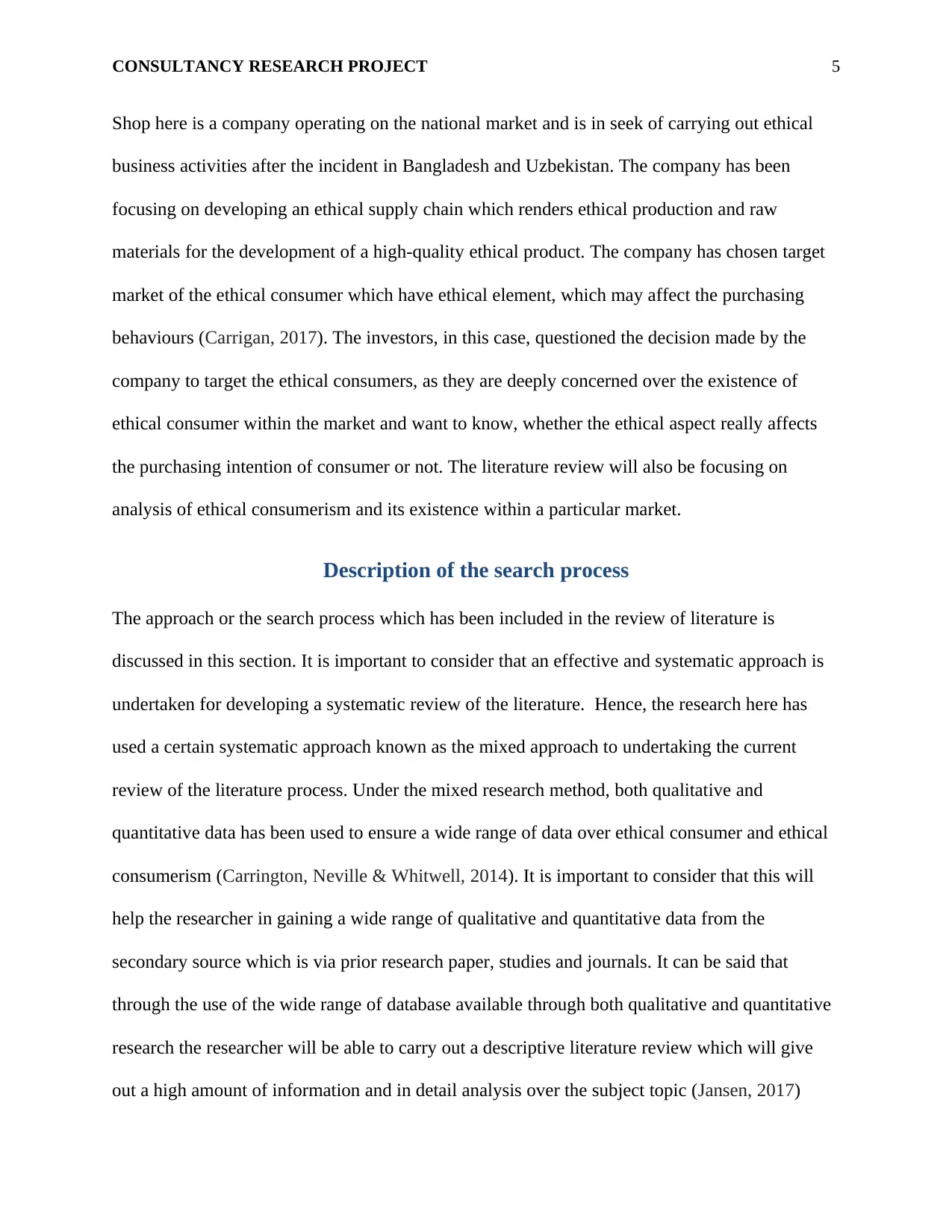
CONSULTANCY RESEARCH PROJECT 5
Shop here is a company operating on the national market and is in seek of carrying out ethical
business activities after the incident in Bangladesh and Uzbekistan. The company has been
focusing on developing an ethical supply chain which renders ethical production and raw
materials for the development of a high-quality ethical product. The company has chosen target
market of the ethical consumer which have ethical element, which may affect the purchasing
behaviours (Carrigan, 2017). The investors, in this case, questioned the decision made by the
company to target the ethical consumers, as they are deeply concerned over the existence of
ethical consumer within the market and want to know, whether the ethical aspect really affects
the purchasing intention of consumer or not. The literature review will also be focusing on
analysis of ethical consumerism and its existence within a particular market.
Description of the search process
The approach or the search process which has been included in the review of literature is
discussed in this section. It is important to consider that an effective and systematic approach is
undertaken for developing a systematic review of the literature. Hence, the research here has
used a certain systematic approach known as the mixed approach to undertaking the current
review of the literature process. Under the mixed research method, both qualitative and
quantitative data has been used to ensure a wide range of data over ethical consumer and ethical
consumerism (Carrington, Neville & Whitwell, 2014). It is important to consider that this will
help the researcher in gaining a wide range of qualitative and quantitative data from the
secondary source which is via prior research paper, studies and journals. It can be said that
through the use of the wide range of database available through both qualitative and quantitative
research the researcher will be able to carry out a descriptive literature review which will give
out a high amount of information and in detail analysis over the subject topic (Jansen, 2017)
Shop here is a company operating on the national market and is in seek of carrying out ethical
business activities after the incident in Bangladesh and Uzbekistan. The company has been
focusing on developing an ethical supply chain which renders ethical production and raw
materials for the development of a high-quality ethical product. The company has chosen target
market of the ethical consumer which have ethical element, which may affect the purchasing
behaviours (Carrigan, 2017). The investors, in this case, questioned the decision made by the
company to target the ethical consumers, as they are deeply concerned over the existence of
ethical consumer within the market and want to know, whether the ethical aspect really affects
the purchasing intention of consumer or not. The literature review will also be focusing on
analysis of ethical consumerism and its existence within a particular market.
Description of the search process
The approach or the search process which has been included in the review of literature is
discussed in this section. It is important to consider that an effective and systematic approach is
undertaken for developing a systematic review of the literature. Hence, the research here has
used a certain systematic approach known as the mixed approach to undertaking the current
review of the literature process. Under the mixed research method, both qualitative and
quantitative data has been used to ensure a wide range of data over ethical consumer and ethical
consumerism (Carrington, Neville & Whitwell, 2014). It is important to consider that this will
help the researcher in gaining a wide range of qualitative and quantitative data from the
secondary source which is via prior research paper, studies and journals. It can be said that
through the use of the wide range of database available through both qualitative and quantitative
research the researcher will be able to carry out a descriptive literature review which will give
out a high amount of information and in detail analysis over the subject topic (Jansen, 2017)
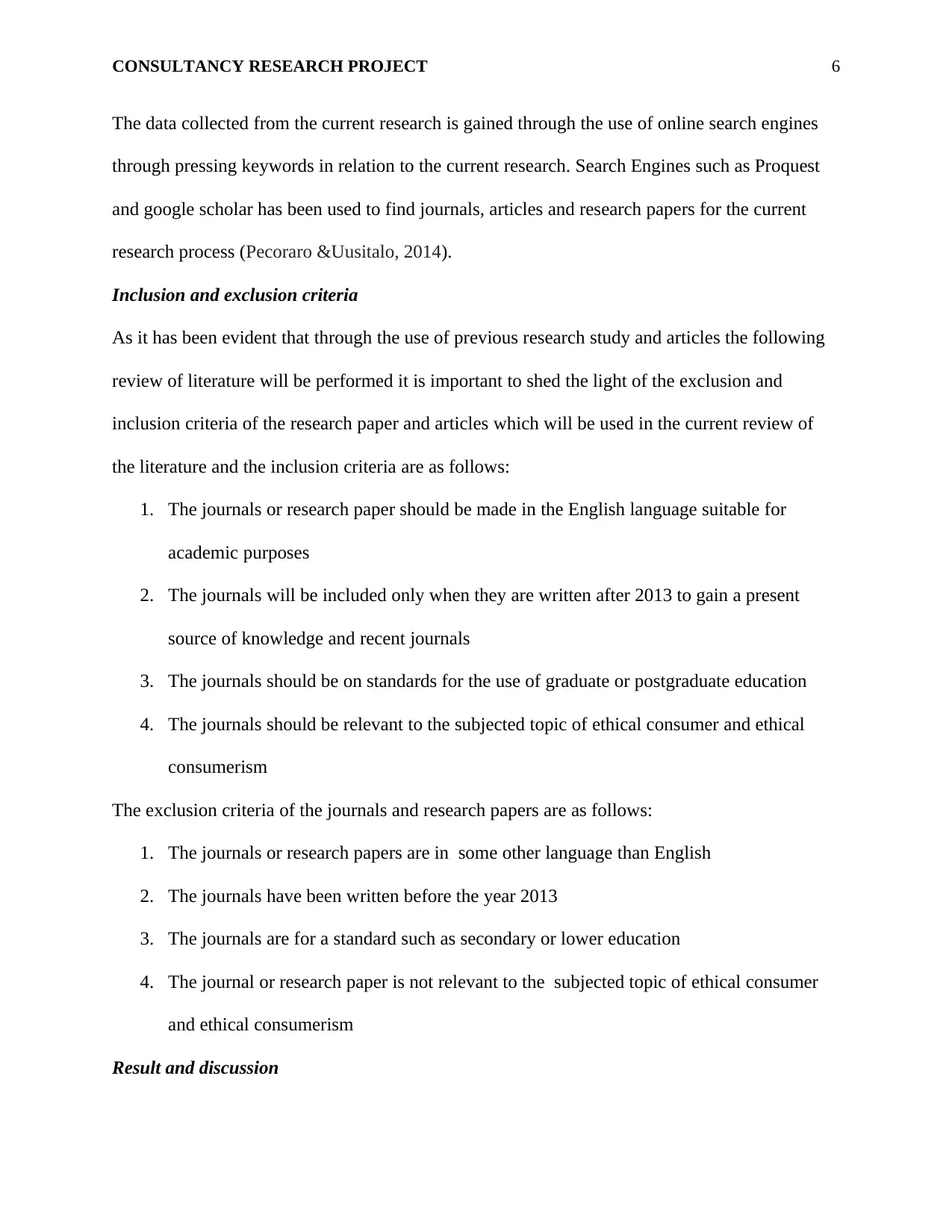
CONSULTANCY RESEARCH PROJECT 6
The data collected from the current research is gained through the use of online search engines
through pressing keywords in relation to the current research. Search Engines such as Proquest
and google scholar has been used to find journals, articles and research papers for the current
research process (Pecoraro &Uusitalo, 2014).
Inclusion and exclusion criteria
As it has been evident that through the use of previous research study and articles the following
review of literature will be performed it is important to shed the light of the exclusion and
inclusion criteria of the research paper and articles which will be used in the current review of
the literature and the inclusion criteria are as follows:
1. The journals or research paper should be made in the English language suitable for
academic purposes
2. The journals will be included only when they are written after 2013 to gain a present
source of knowledge and recent journals
3. The journals should be on standards for the use of graduate or postgraduate education
4. The journals should be relevant to the subjected topic of ethical consumer and ethical
consumerism
The exclusion criteria of the journals and research papers are as follows:
1. The journals or research papers are in some other language than English
2. The journals have been written before the year 2013
3. The journals are for a standard such as secondary or lower education
4. The journal or research paper is not relevant to the subjected topic of ethical consumer
and ethical consumerism
Result and discussion
The data collected from the current research is gained through the use of online search engines
through pressing keywords in relation to the current research. Search Engines such as Proquest
and google scholar has been used to find journals, articles and research papers for the current
research process (Pecoraro &Uusitalo, 2014).
Inclusion and exclusion criteria
As it has been evident that through the use of previous research study and articles the following
review of literature will be performed it is important to shed the light of the exclusion and
inclusion criteria of the research paper and articles which will be used in the current review of
the literature and the inclusion criteria are as follows:
1. The journals or research paper should be made in the English language suitable for
academic purposes
2. The journals will be included only when they are written after 2013 to gain a present
source of knowledge and recent journals
3. The journals should be on standards for the use of graduate or postgraduate education
4. The journals should be relevant to the subjected topic of ethical consumer and ethical
consumerism
The exclusion criteria of the journals and research papers are as follows:
1. The journals or research papers are in some other language than English
2. The journals have been written before the year 2013
3. The journals are for a standard such as secondary or lower education
4. The journal or research paper is not relevant to the subjected topic of ethical consumer
and ethical consumerism
Result and discussion
⊘ This is a preview!⊘
Do you want full access?
Subscribe today to unlock all pages.

Trusted by 1+ million students worldwide
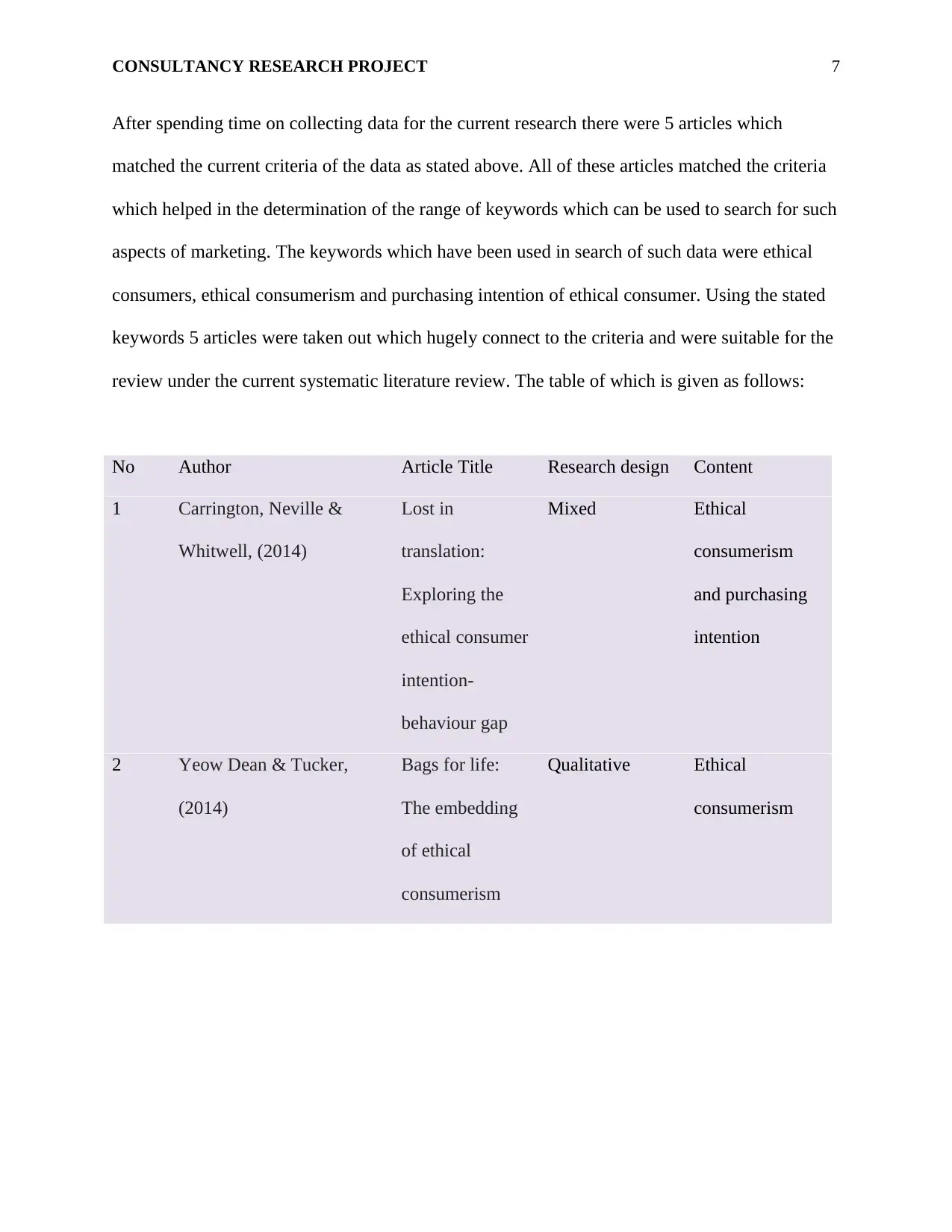
CONSULTANCY RESEARCH PROJECT 7
After spending time on collecting data for the current research there were 5 articles which
matched the current criteria of the data as stated above. All of these articles matched the criteria
which helped in the determination of the range of keywords which can be used to search for such
aspects of marketing. The keywords which have been used in search of such data were ethical
consumers, ethical consumerism and purchasing intention of ethical consumer. Using the stated
keywords 5 articles were taken out which hugely connect to the criteria and were suitable for the
review under the current systematic literature review. The table of which is given as follows:
No Author Article Title Research design Content
1 Carrington, Neville &
Whitwell, (2014)
Lost in
translation:
Exploring the
ethical consumer
intention-
behaviour gap
Mixed Ethical
consumerism
and purchasing
intention
2 Yeow Dean & Tucker,
(2014)
Bags for life:
The embedding
of ethical
consumerism
Qualitative Ethical
consumerism
After spending time on collecting data for the current research there were 5 articles which
matched the current criteria of the data as stated above. All of these articles matched the criteria
which helped in the determination of the range of keywords which can be used to search for such
aspects of marketing. The keywords which have been used in search of such data were ethical
consumers, ethical consumerism and purchasing intention of ethical consumer. Using the stated
keywords 5 articles were taken out which hugely connect to the criteria and were suitable for the
review under the current systematic literature review. The table of which is given as follows:
No Author Article Title Research design Content
1 Carrington, Neville &
Whitwell, (2014)
Lost in
translation:
Exploring the
ethical consumer
intention-
behaviour gap
Mixed Ethical
consumerism
and purchasing
intention
2 Yeow Dean & Tucker,
(2014)
Bags for life:
The embedding
of ethical
consumerism
Qualitative Ethical
consumerism
Paraphrase This Document
Need a fresh take? Get an instant paraphrase of this document with our AI Paraphraser
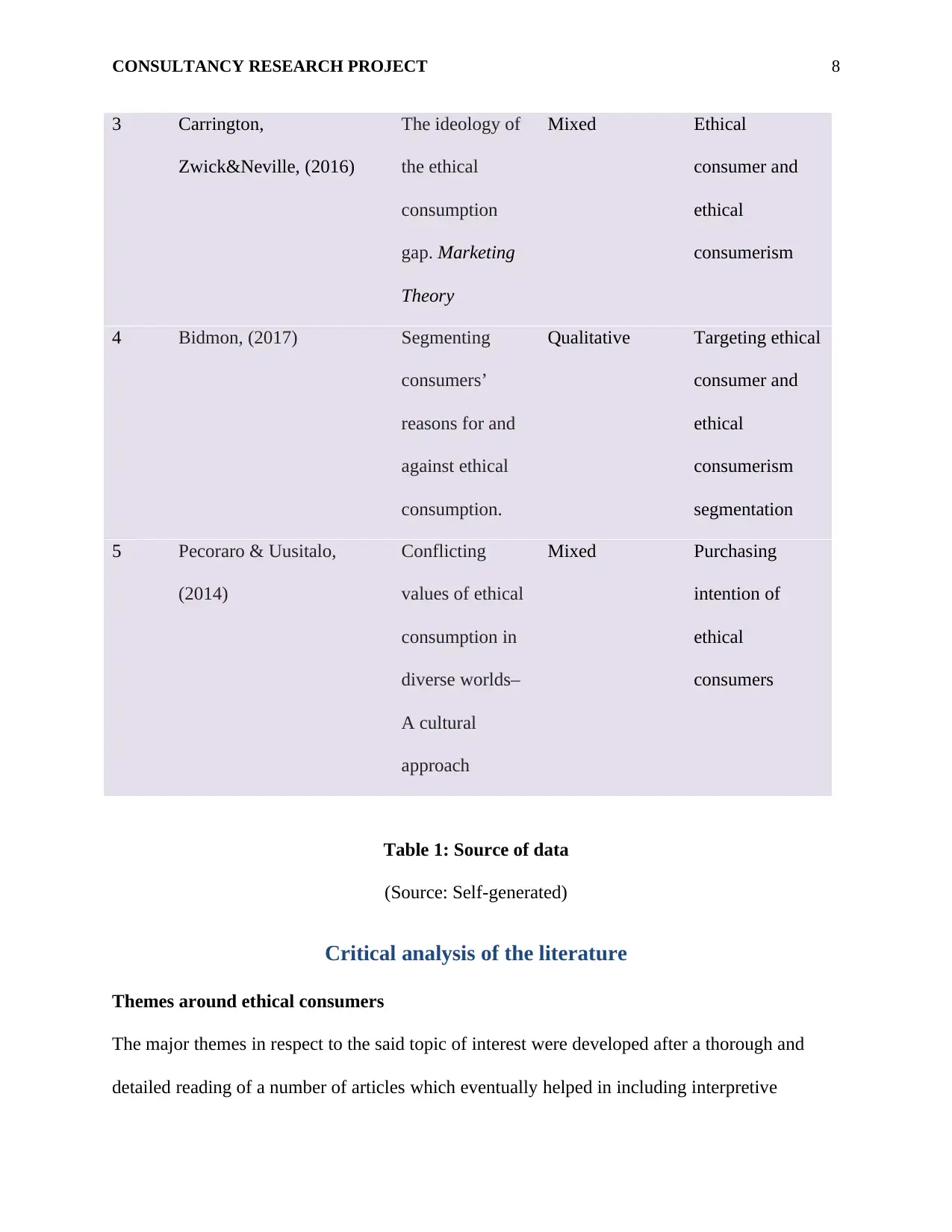
CONSULTANCY RESEARCH PROJECT 8
3 Carrington,
Zwick&Neville, (2016)
The ideology of
the ethical
consumption
gap. Marketing
Theory
Mixed Ethical
consumer and
ethical
consumerism
4 Bidmon, (2017) Segmenting
consumers’
reasons for and
against ethical
consumption.
Qualitative Targeting ethical
consumer and
ethical
consumerism
segmentation
5 Pecoraro & Uusitalo,
(2014)
Conflicting
values of ethical
consumption in
diverse worlds–
A cultural
approach
Mixed Purchasing
intention of
ethical
consumers
Table 1: Source of data
(Source: Self-generated)
Critical analysis of the literature
Themes around ethical consumers
The major themes in respect to the said topic of interest were developed after a thorough and
detailed reading of a number of articles which eventually helped in including interpretive
3 Carrington,
Zwick&Neville, (2016)
The ideology of
the ethical
consumption
gap. Marketing
Theory
Mixed Ethical
consumer and
ethical
consumerism
4 Bidmon, (2017) Segmenting
consumers’
reasons for and
against ethical
consumption.
Qualitative Targeting ethical
consumer and
ethical
consumerism
segmentation
5 Pecoraro & Uusitalo,
(2014)
Conflicting
values of ethical
consumption in
diverse worlds–
A cultural
approach
Mixed Purchasing
intention of
ethical
consumers
Table 1: Source of data
(Source: Self-generated)
Critical analysis of the literature
Themes around ethical consumers
The major themes in respect to the said topic of interest were developed after a thorough and
detailed reading of a number of articles which eventually helped in including interpretive
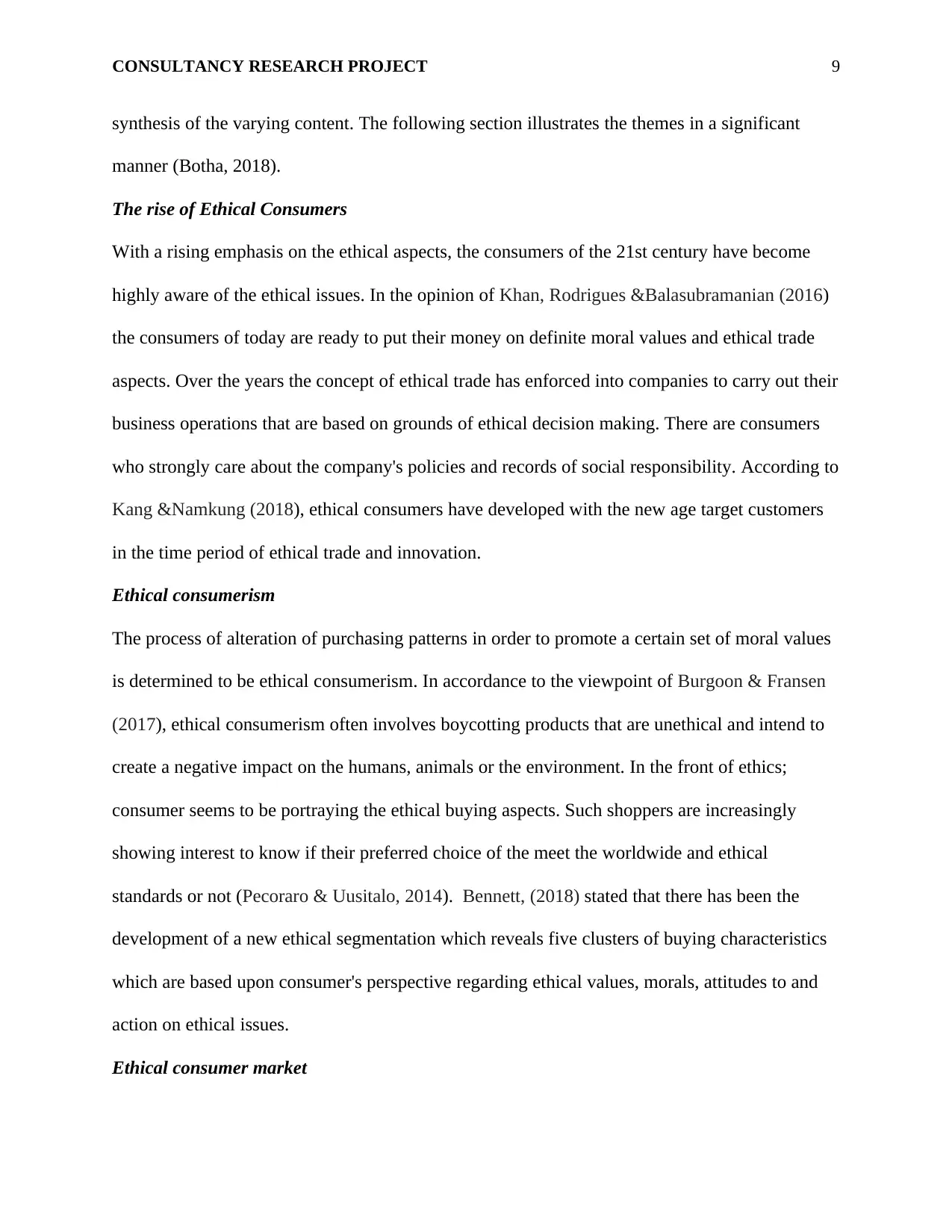
CONSULTANCY RESEARCH PROJECT 9
synthesis of the varying content. The following section illustrates the themes in a significant
manner (Botha, 2018).
The rise of Ethical Consumers
With a rising emphasis on the ethical aspects, the consumers of the 21st century have become
highly aware of the ethical issues. In the opinion of Khan, Rodrigues &Balasubramanian (2016)
the consumers of today are ready to put their money on definite moral values and ethical trade
aspects. Over the years the concept of ethical trade has enforced into companies to carry out their
business operations that are based on grounds of ethical decision making. There are consumers
who strongly care about the company's policies and records of social responsibility. According to
Kang &Namkung (2018), ethical consumers have developed with the new age target customers
in the time period of ethical trade and innovation.
Ethical consumerism
The process of alteration of purchasing patterns in order to promote a certain set of moral values
is determined to be ethical consumerism. In accordance to the viewpoint of Burgoon & Fransen
(2017), ethical consumerism often involves boycotting products that are unethical and intend to
create a negative impact on the humans, animals or the environment. In the front of ethics;
consumer seems to be portraying the ethical buying aspects. Such shoppers are increasingly
showing interest to know if their preferred choice of the meet the worldwide and ethical
standards or not (Pecoraro & Uusitalo, 2014). Bennett, (2018) stated that there has been the
development of a new ethical segmentation which reveals five clusters of buying characteristics
which are based upon consumer's perspective regarding ethical values, morals, attitudes to and
action on ethical issues.
Ethical consumer market
synthesis of the varying content. The following section illustrates the themes in a significant
manner (Botha, 2018).
The rise of Ethical Consumers
With a rising emphasis on the ethical aspects, the consumers of the 21st century have become
highly aware of the ethical issues. In the opinion of Khan, Rodrigues &Balasubramanian (2016)
the consumers of today are ready to put their money on definite moral values and ethical trade
aspects. Over the years the concept of ethical trade has enforced into companies to carry out their
business operations that are based on grounds of ethical decision making. There are consumers
who strongly care about the company's policies and records of social responsibility. According to
Kang &Namkung (2018), ethical consumers have developed with the new age target customers
in the time period of ethical trade and innovation.
Ethical consumerism
The process of alteration of purchasing patterns in order to promote a certain set of moral values
is determined to be ethical consumerism. In accordance to the viewpoint of Burgoon & Fransen
(2017), ethical consumerism often involves boycotting products that are unethical and intend to
create a negative impact on the humans, animals or the environment. In the front of ethics;
consumer seems to be portraying the ethical buying aspects. Such shoppers are increasingly
showing interest to know if their preferred choice of the meet the worldwide and ethical
standards or not (Pecoraro & Uusitalo, 2014). Bennett, (2018) stated that there has been the
development of a new ethical segmentation which reveals five clusters of buying characteristics
which are based upon consumer's perspective regarding ethical values, morals, attitudes to and
action on ethical issues.
Ethical consumer market
⊘ This is a preview!⊘
Do you want full access?
Subscribe today to unlock all pages.

Trusted by 1+ million students worldwide
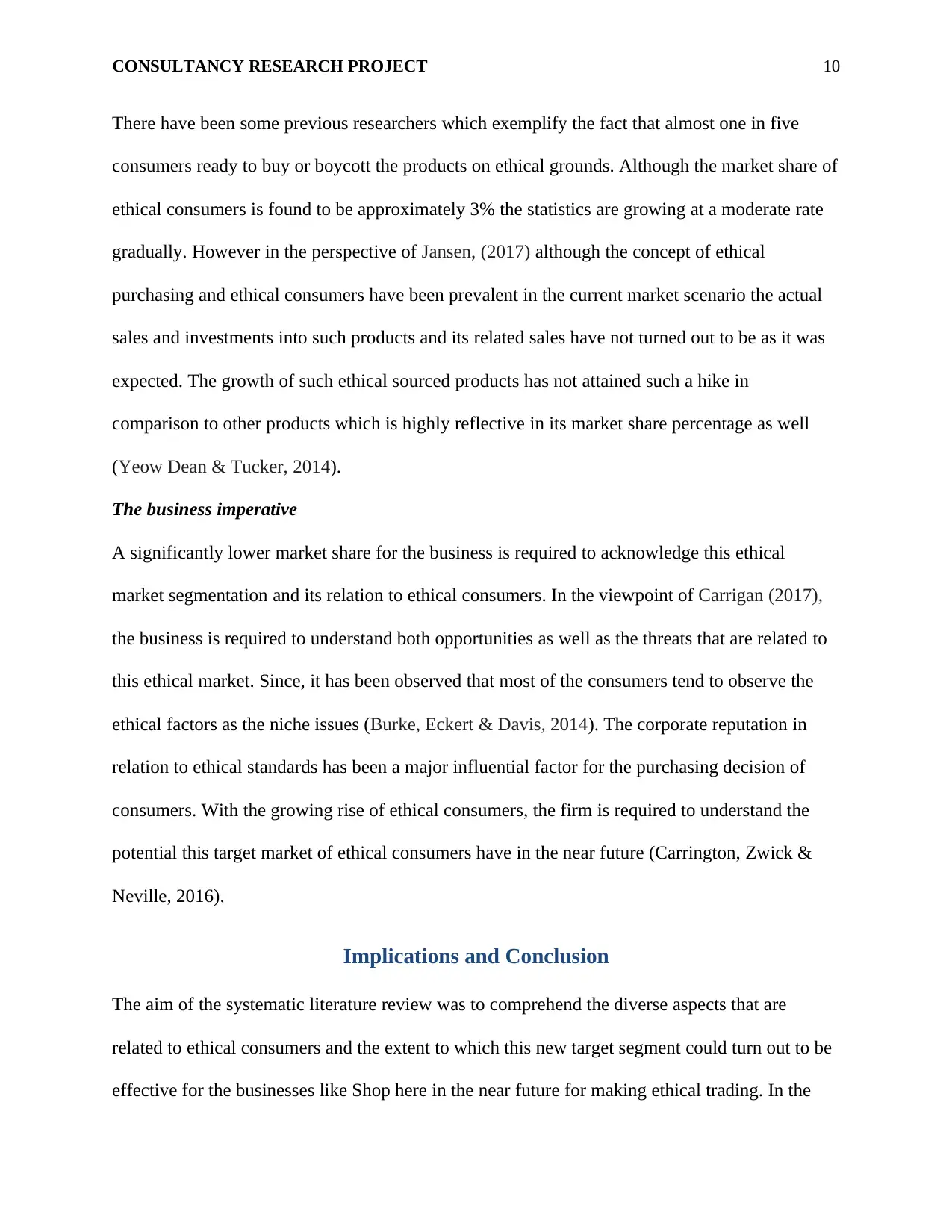
CONSULTANCY RESEARCH PROJECT 10
There have been some previous researchers which exemplify the fact that almost one in five
consumers ready to buy or boycott the products on ethical grounds. Although the market share of
ethical consumers is found to be approximately 3% the statistics are growing at a moderate rate
gradually. However in the perspective of Jansen, (2017) although the concept of ethical
purchasing and ethical consumers have been prevalent in the current market scenario the actual
sales and investments into such products and its related sales have not turned out to be as it was
expected. The growth of such ethical sourced products has not attained such a hike in
comparison to other products which is highly reflective in its market share percentage as well
(Yeow Dean & Tucker, 2014).
The business imperative
A significantly lower market share for the business is required to acknowledge this ethical
market segmentation and its relation to ethical consumers. In the viewpoint of Carrigan (2017),
the business is required to understand both opportunities as well as the threats that are related to
this ethical market. Since, it has been observed that most of the consumers tend to observe the
ethical factors as the niche issues (Burke, Eckert & Davis, 2014). The corporate reputation in
relation to ethical standards has been a major influential factor for the purchasing decision of
consumers. With the growing rise of ethical consumers, the firm is required to understand the
potential this target market of ethical consumers have in the near future (Carrington, Zwick &
Neville, 2016).
Implications and Conclusion
The aim of the systematic literature review was to comprehend the diverse aspects that are
related to ethical consumers and the extent to which this new target segment could turn out to be
effective for the businesses like Shop here in the near future for making ethical trading. In the
There have been some previous researchers which exemplify the fact that almost one in five
consumers ready to buy or boycott the products on ethical grounds. Although the market share of
ethical consumers is found to be approximately 3% the statistics are growing at a moderate rate
gradually. However in the perspective of Jansen, (2017) although the concept of ethical
purchasing and ethical consumers have been prevalent in the current market scenario the actual
sales and investments into such products and its related sales have not turned out to be as it was
expected. The growth of such ethical sourced products has not attained such a hike in
comparison to other products which is highly reflective in its market share percentage as well
(Yeow Dean & Tucker, 2014).
The business imperative
A significantly lower market share for the business is required to acknowledge this ethical
market segmentation and its relation to ethical consumers. In the viewpoint of Carrigan (2017),
the business is required to understand both opportunities as well as the threats that are related to
this ethical market. Since, it has been observed that most of the consumers tend to observe the
ethical factors as the niche issues (Burke, Eckert & Davis, 2014). The corporate reputation in
relation to ethical standards has been a major influential factor for the purchasing decision of
consumers. With the growing rise of ethical consumers, the firm is required to understand the
potential this target market of ethical consumers have in the near future (Carrington, Zwick &
Neville, 2016).
Implications and Conclusion
The aim of the systematic literature review was to comprehend the diverse aspects that are
related to ethical consumers and the extent to which this new target segment could turn out to be
effective for the businesses like Shop here in the near future for making ethical trading. In the
Paraphrase This Document
Need a fresh take? Get an instant paraphrase of this document with our AI Paraphraser
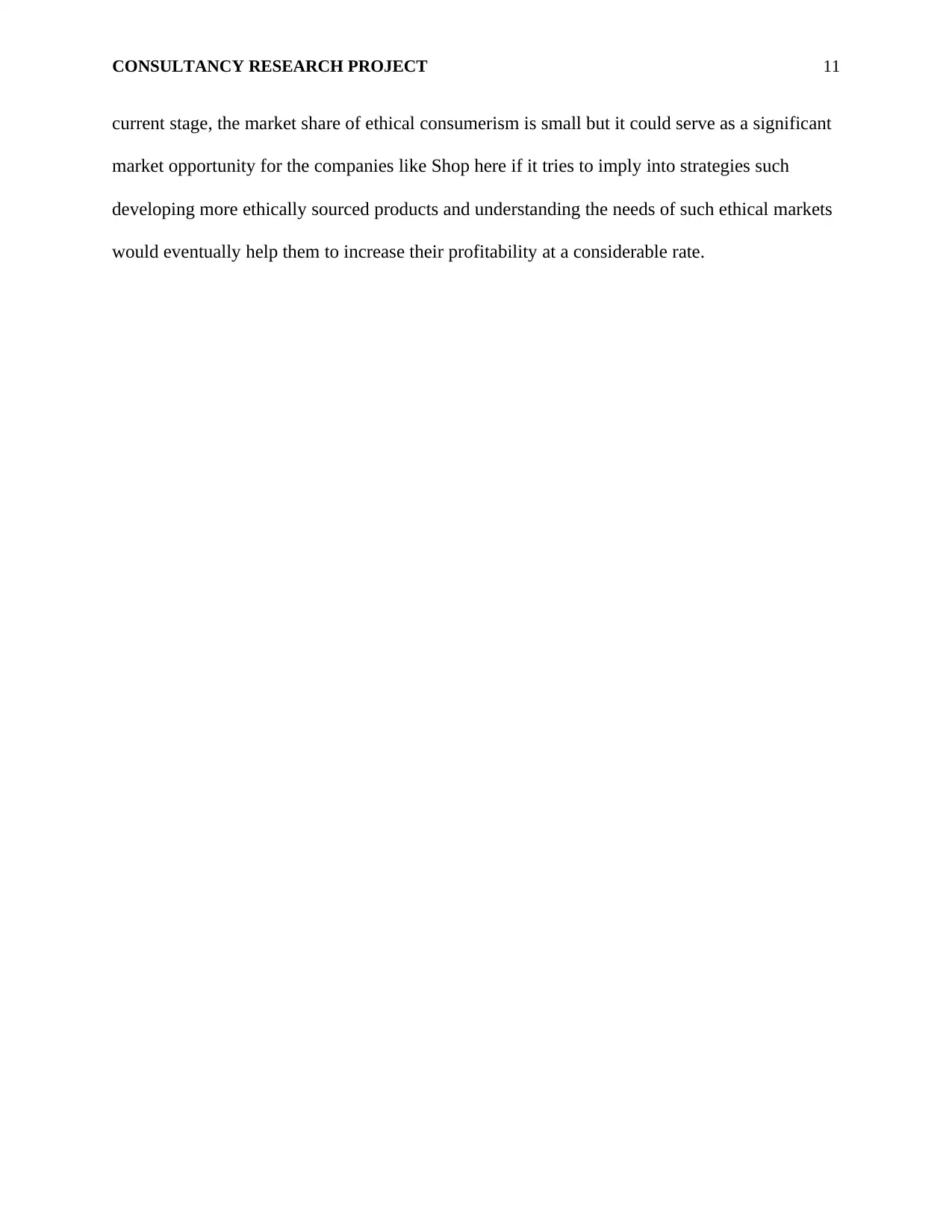
CONSULTANCY RESEARCH PROJECT 11
current stage, the market share of ethical consumerism is small but it could serve as a significant
market opportunity for the companies like Shop here if it tries to imply into strategies such
developing more ethically sourced products and understanding the needs of such ethical markets
would eventually help them to increase their profitability at a considerable rate.
current stage, the market share of ethical consumerism is small but it could serve as a significant
market opportunity for the companies like Shop here if it tries to imply into strategies such
developing more ethically sourced products and understanding the needs of such ethical markets
would eventually help them to increase their profitability at a considerable rate.
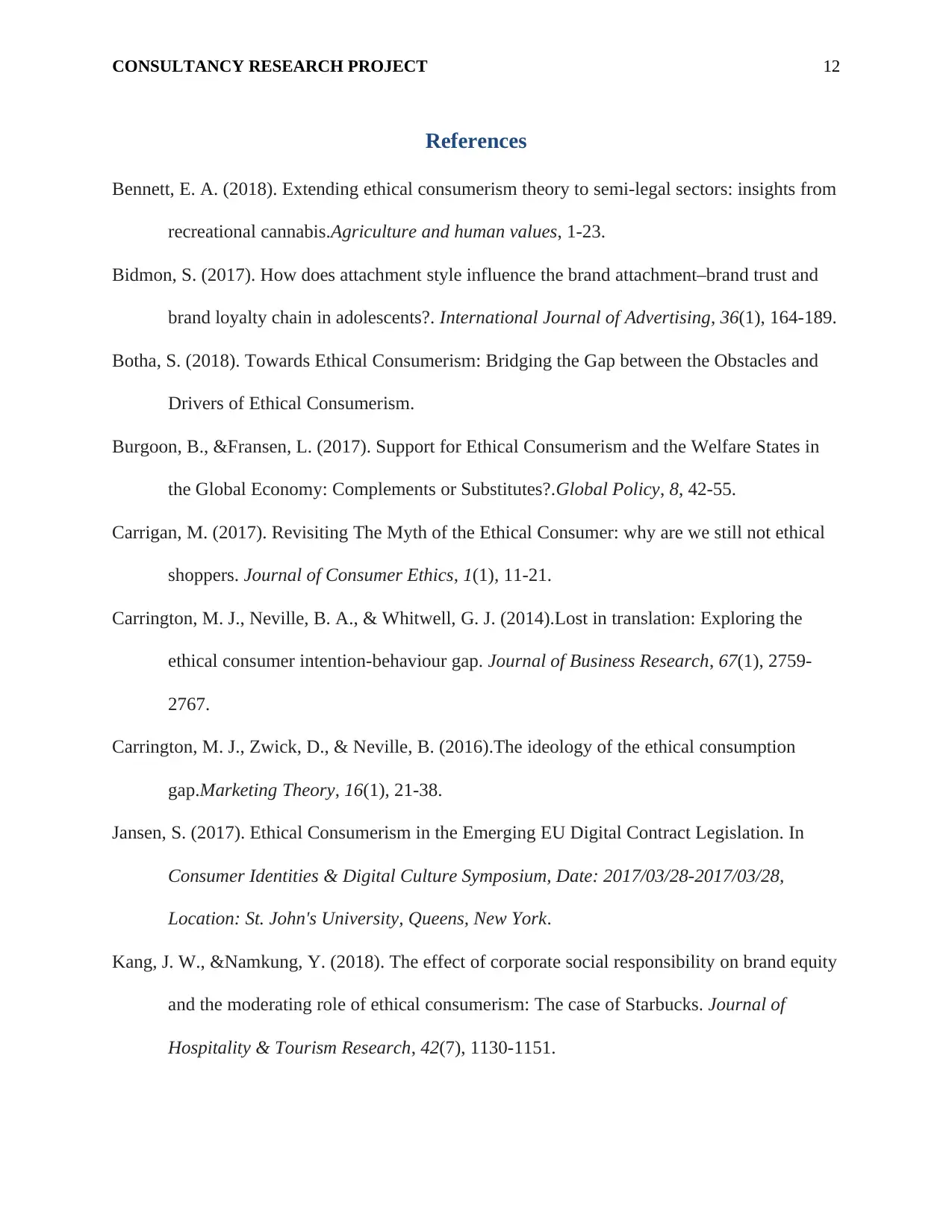
CONSULTANCY RESEARCH PROJECT 12
References
Bennett, E. A. (2018). Extending ethical consumerism theory to semi-legal sectors: insights from
recreational cannabis.Agriculture and human values, 1-23.
Bidmon, S. (2017). How does attachment style influence the brand attachment–brand trust and
brand loyalty chain in adolescents?. International Journal of Advertising, 36(1), 164-189.
Botha, S. (2018). Towards Ethical Consumerism: Bridging the Gap between the Obstacles and
Drivers of Ethical Consumerism.
Burgoon, B., &Fransen, L. (2017). Support for Ethical Consumerism and the Welfare States in
the Global Economy: Complements or Substitutes?.Global Policy, 8, 42-55.
Carrigan, M. (2017). Revisiting The Myth of the Ethical Consumer: why are we still not ethical
shoppers. Journal of Consumer Ethics, 1(1), 11-21.
Carrington, M. J., Neville, B. A., & Whitwell, G. J. (2014).Lost in translation: Exploring the
ethical consumer intention-behaviour gap. Journal of Business Research, 67(1), 2759-
2767.
Carrington, M. J., Zwick, D., & Neville, B. (2016).The ideology of the ethical consumption
gap.Marketing Theory, 16(1), 21-38.
Jansen, S. (2017). Ethical Consumerism in the Emerging EU Digital Contract Legislation. In
Consumer Identities & Digital Culture Symposium, Date: 2017/03/28-2017/03/28,
Location: St. John's University, Queens, New York.
Kang, J. W., &Namkung, Y. (2018). The effect of corporate social responsibility on brand equity
and the moderating role of ethical consumerism: The case of Starbucks. Journal of
Hospitality & Tourism Research, 42(7), 1130-1151.
References
Bennett, E. A. (2018). Extending ethical consumerism theory to semi-legal sectors: insights from
recreational cannabis.Agriculture and human values, 1-23.
Bidmon, S. (2017). How does attachment style influence the brand attachment–brand trust and
brand loyalty chain in adolescents?. International Journal of Advertising, 36(1), 164-189.
Botha, S. (2018). Towards Ethical Consumerism: Bridging the Gap between the Obstacles and
Drivers of Ethical Consumerism.
Burgoon, B., &Fransen, L. (2017). Support for Ethical Consumerism and the Welfare States in
the Global Economy: Complements or Substitutes?.Global Policy, 8, 42-55.
Carrigan, M. (2017). Revisiting The Myth of the Ethical Consumer: why are we still not ethical
shoppers. Journal of Consumer Ethics, 1(1), 11-21.
Carrington, M. J., Neville, B. A., & Whitwell, G. J. (2014).Lost in translation: Exploring the
ethical consumer intention-behaviour gap. Journal of Business Research, 67(1), 2759-
2767.
Carrington, M. J., Zwick, D., & Neville, B. (2016).The ideology of the ethical consumption
gap.Marketing Theory, 16(1), 21-38.
Jansen, S. (2017). Ethical Consumerism in the Emerging EU Digital Contract Legislation. In
Consumer Identities & Digital Culture Symposium, Date: 2017/03/28-2017/03/28,
Location: St. John's University, Queens, New York.
Kang, J. W., &Namkung, Y. (2018). The effect of corporate social responsibility on brand equity
and the moderating role of ethical consumerism: The case of Starbucks. Journal of
Hospitality & Tourism Research, 42(7), 1130-1151.
⊘ This is a preview!⊘
Do you want full access?
Subscribe today to unlock all pages.

Trusted by 1+ million students worldwide
1 out of 13
Related Documents
Your All-in-One AI-Powered Toolkit for Academic Success.
+13062052269
info@desklib.com
Available 24*7 on WhatsApp / Email
![[object Object]](/_next/static/media/star-bottom.7253800d.svg)
Unlock your academic potential
Copyright © 2020–2026 A2Z Services. All Rights Reserved. Developed and managed by ZUCOL.





